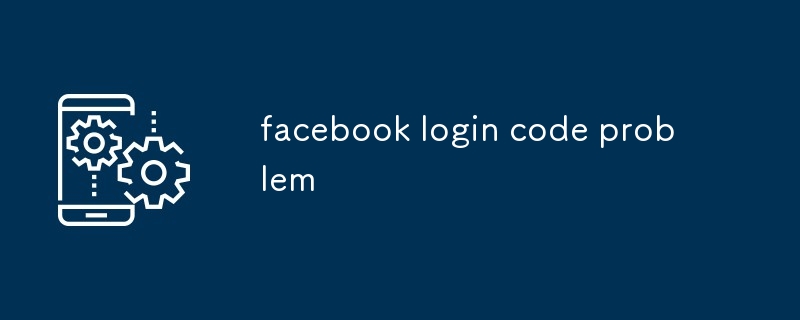Home >Software Tutorial >Mobile Application >facebook login code problem
facebook login code problem
- DDDOriginal
- 2024-09-10 15:35:171034browse
Troubleshoot Facebook login issues by verifying app settings, resolving error codes like OAuthException, and considering troubleshooting steps such as clearing browser cache and disabling extensions. Error codes provide specific information on login

Facebook Login Issue
If you are having trouble logging in to your website using Facebook, there are a few steps you can take to troubleshoot the issue:
- Verify your Facebook App settings: Ensure that your Facebook app is set up correctly and has the necessary permissions to log in to your website. Check the app settings in the Facebook Developer Console.
Why am I receiving an error code when trying to login with Facebook?
Error codes can indicate specific problems with the login process. Common error codes include:
- OAuthException: Indicates a problem with the OAuth authorization process.
- InvalidScopeException: The scope of the access token is invalid or insufficient.
- UserCanceledException: The user canceled the login process.
To resolve error codes, check the error message for more information and consult the Facebook Developer documentation for specific troubleshooting steps.
How do I troubleshoot Facebook login authorization problems?
If you are unable to log in with Facebook despite resolving any error codes, consider the following troubleshooting steps:
- Clear your browser cache and cookies: This can remove any corrupted data that may interfere with the login process.
- Disable browser extensions: Certain browser extensions may block or interfere with Facebook login. Disable them temporarily to see if it resolves the issue.
- Check your permissions: Ensure that your Facebook app has the necessary permissions to log in to your website. You can check and update permissions in the Facebook Developer Console.
The above is the detailed content of facebook login code problem. For more information, please follow other related articles on the PHP Chinese website!
Related articles
See more- Where is Taobao's 1 million free order event?
- How to invite friends on Alipay Ant Wish. Share how to save money by inviting friends on Ant Wish.
- How to cancel automatic purchase of Shuqi novels_Tutorial on canceling automatic purchase of Shuqi novels
- How to create Feishu questionnaire How to create Feishu questionnaire
- Mango TV supports several people to watch together

